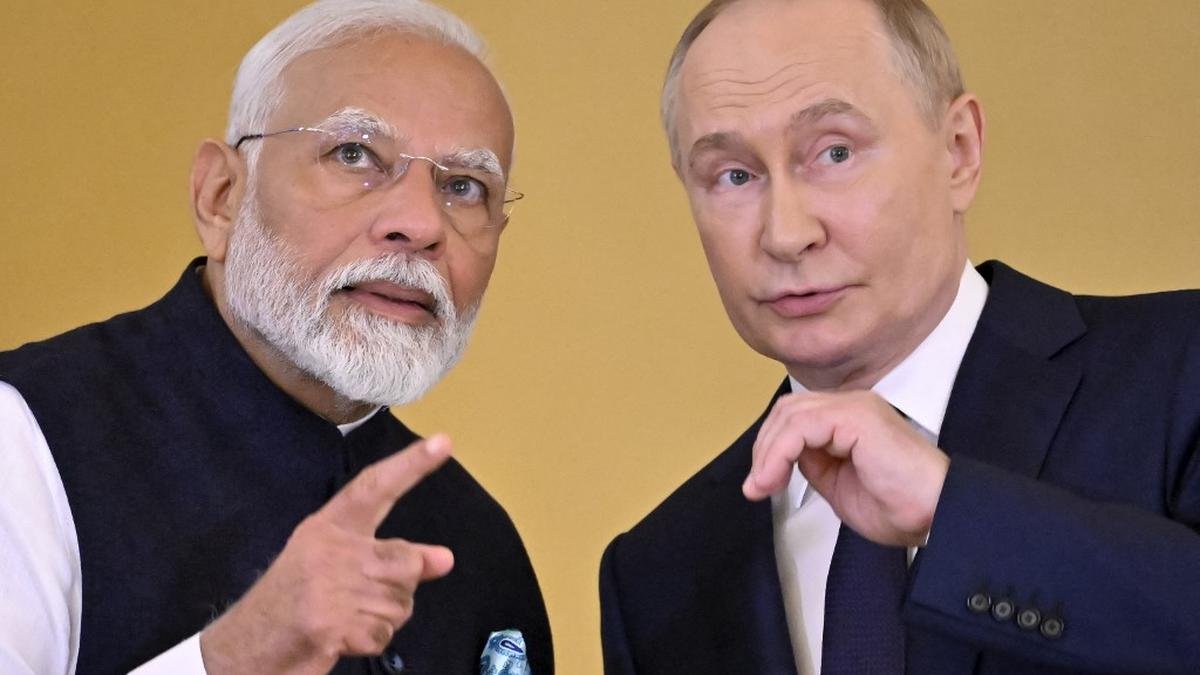India and Russia agreed to increase bilateral trade to $100 billion dollars by 2030, including the use of national currencies to circumvent Western sanctions, as Prime Minister Narendra Modi and Russian President Vladimir Putin sat down for the 22nd Annual Summit here on Tuesday. This was their first meeting since the war in Ukraine began two years ago, and Mr. Modi made a “pained” plea for an end to civilian deaths and the conflict.
In addition, sources said Mr. Putin accepted a direct request from Mr. Modi to expedite the discharge of all Indians who have been recruited by the Russian military, many of whom are now at the war front, where four Indians have been killed this year. However, the assurance did not find a mention in the joint statement, and Foreign Secretary Vinay Kwatra said that the decision to speed up military discharges for approximately 40 men still at the war front would be “worked through the processes” through diplomatic discussions.
In their joint statement, India and Russia highlighted the need for a peaceful resolution of the “conflict around Ukraine” , the phrase reflecting Russia’s claims.
“They noted with appreciation relevant proposals of mediation and good offices aimed at peaceful resolution of the conflict in accordance with international law and on the basis of the UN Charter,” the statement issued read.
Also read: India stands for dialogue, territorial integrity and sovereignty: Government
The meeting between India and Russia came under attack from Kyiv where Ukrainian President called Mr. Modi’s warm embrace of Mr. Putin a “devastating loss” to the peace process, on a day when Ukraine accused Russia of missile strikes, including on a children’s hospital, and from Washington where the U.S. State Department raised “concerns” over India’s ties with Russia.
In comments at the beginning of the summit in Moscow, Mr. Modi addressed some of those concerns by saying that he felt “pained” by the loss of civilian lives especially “innocent children”, which he said made his heart “explode”.
”Whether it is war, conflict or a terrorist attack, any person who believes in humanity, is pained when there is loss of lives, especially when innocent children die,” Mr. Modi said, without directly referencing Monday’s missile attacks. He also said that he believed that “no solution to the Ukraine conflict could be found on the battlefield”, adding that he left Moscow “with hope” after his talks with Mr. Putin.
In response, Mr. Putin said he “appreciated” Mr. Modi’s efforts to find a peaceful solution to the conflict, but gave no assurances.
Mr. Modi also made a particular mention of Russia’s support to India despite the pandemic and geopolitical flux that had helped India avert a crisis in “food, fuel and fertilizer” supplies, and thanked Mr. Putin for his leadership.
Also read: No solution to any conflict is possible on the battlefield, PM Modi tells President Putin
The leaders also agreed to a cooperation statement on projects in Russia’s Far East that Mr. Putin has been focused on developing.
A joint vision statement on trade and economic cooperation by the end of the decade looked at nine issues including the elimination of non-tariff barriers, the development of a “bilateral settlement system using national currencies”, ironing out customs procedures and using new connectivity routes, including the Chennai-Vladivostok maritime route and Northern Sea Route and the International North–South Transport Corridor via Iran, investments in the energy sector including nuclear energy, infrastructure development and investment promotion as “priority areas”.
In addition, India and Russia signed a number of MoUs between institutions on climate change, polar research, legal arbitration and pharmaceutical certification and other issues. Earlier, addressing about 500 members of the Indian diaspora in Russia, Mr. Modi announced that Russia had agreed to India’s request to open two new consulates in Kazan and Yekaterinburg to help facilitate services for the growing community.
Ambitious bilateral trade target
The bilateral trade target set by the leaders should be reasonably easy to achieve, given that, already, trade stands at around U.S. $65 billion, mostly because of the surge in India’s imports of Russian crude at discount after the invasion of Ukraine led to the oil sanctions by the U.S. and Europe. In his preliminary comments, Mr. Putin pointed out that Russia-India trade grew by 66% last year and 20% just in the first quarter of 2024.
Achieving the target would catapult the business relationship to levels of trade India currently has only with bigger economies like the U.S., China and the European Union.
When asked about the target, Mr. Kwatra said it was “an expression of the ambition by the two leaders for the larger economic relationship which includes the trade relationship”, and said that Mr. Modi particularly stressed on broad-basing the trade basket of goods between the two countries.
Also read: Modi in Russia highlights
The focus on economic issues was a shift from previous Annual Summits where military supplies and the defence and strategic partnership between the two countries had been at the top of the agenda. Officials said that the two leaders discussed the delay in defence supplies, and have committed to exploring more areas of co-production of defence equipment like the India-Russia joint venture for assault rifles that could fill the domestic gap as well as facilitate export to other countries.
Mr. Modi accepted Russia’s highest civilian honour — the Order of St. Andrew the Apostle, an award that had been announced by Mr. Putin in 2019, but could only be presented now. The Russian leader also invited Mr. Modi to return in a few months to the city of Kazan where he will host the first “Extended BRICS” summit, including five new members to the Brazil-Russia-India-China-South Africa grouping of emerging economies, due to be held in October 2024.
